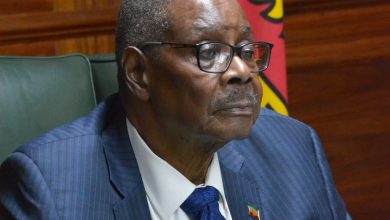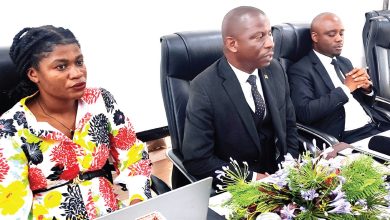Atupele, Kabambe and JB in first debate
What was planned to be a five-candidate showdown ended up being a three-hopeful affair, but this did not dampen their spirits as they faced the nation and outline their policies ahead of the September 16 General Election.
The venue was Bingu International Convention Centre in Lilongwe where former president Joyce Banda of People’s Party, Dalitso Kabambe (DK) of UTM Party and United Democratic Front (UDF) president Atupele Muluzi faced off.
From the economy to agriculture, gender, governance, water and sanitation, public finance management and fighting corruption, the candidates calmly articulated their positions on the given topics.
Taking turns, moderators Joab Chakhaza and Leah Malekano posed questions to the trio with follow ups where necessary.
With that, the first of three presidential debates planned by the Presidential Debates Task Force targeting candidates from parties that were represented in the recently dissolved Parliament took off minus incumbent President Lazarus Chakwera of Malawi Congress Party and his rival Peter Mutharika of Democratic Progressive Party.

Banda, the sole female candidate in the race, pitched herself as “a tested leader” capable of transforming the economy the same way she did during her presidency.
On the other hand, Kabambe painted a dire picture of “a bad state of hunger, poverty and economic collapse” while Atupele, who served in Banda’s Cabinet between 2012 and 2014, as well as the Mutharika administration between 2014 and 2019, argued that the worsening poverty over the past five years is evidence that Malawi needs “good leadership that will confront corruption decisively.”
Pressed on why Malawians believe the fight against corruption is failing, with two-thirds saying the country is headed in the wrong direction as per findings of a recent Pan-African research agency Afrobarometer survey, Atupele said the problem lies at the top.
“It all boils down to a leader. Corrupt
leadership breeds a corrupt society. Good leaders are there and Malawians know them. Transparency is key, especially in procurement,” he said.
On his part, Kabambe pledged sweeping reforms to end impunity. Like his UTM Party predecessor the late Saulos Chilima, he preached removal of presidential immunity from prosecution.
“We must have equality before the law. I will strengthen the Anti-Corruption Bureau and the Auditor General by appointing competent directors and officers. We will also conduct forensic audits of all State institutions starting with State House. All payments above K500 000 will be scrutinised and no public officer will be spared,” he said.
Banda also underscored the need for “decisive leadership” and pledged to push for changes in the legal framework to tackle graft in the Judiciary.
Responding to a question on what they would do in their first 100 days to tackle youth unemployment and poverty, Atupele vowed to liberalise the exchange rate and abolish the peg, saying “the kwacha must reflect its real value if we are to restore investor confidence”.
Kabambe, on the other hand promised to cut Malawi’s import bill and strengthen exports by restructuring the budget, saying: “Seventy percent of government resources currently go to imports. We must change this so that farmers and industries drive the trade balance.”
Taking her turn, Banda pledged to realign the kwacha and introduce cash-for-work programmes to cushion Malawians from inflation, stressing that “food security is the first line of defence for the poor”.
The trio also lamented the estimated K20 trillion public debt and proposed austerity measures as one way of taming the government’s huge appetite for borrowing.
Kabambe, an economist, described debt as “a poison in any economy,” adding that domestic borrowing “cripples industry and crushes growth” while international debt “drains forex and kills the economy”.
Atupele shared the same sentiments, highlighting that debt distress stems from over-borrowing, but he positioned himself as a clean leader who could restore credibility.
“Investor confidence is key and it starts with leadership not associated with corruption,” he said.
The trio was also unanimous that Malawi cannot do away with the World Bank and the International Monetary Fund, but differed on how to protect the poor under the Bretton Woods institutions’ reform programmes’ conditionalities.
Beyond the economy, education, health, water and sanitation also featured in the debate, with the trio committing to ensure that resources are saved and channelled towards strengthening the social sectors. Each stressed that fiscal discipline would create room to invest in schools, hospitals and clean water systems as part of improving the quality of life for Malawians.
The debate laid bare stark differences in approach but also highlighted shared recognition that fixing the economy and stamping out corruption are Malawi’s most urgent tasks.
Reacting to the debate, Malawi Human Rights Commission executive secretary Habiba Osman described it as “very interesting” for elevating both economic and rights-based concerns.
“What was missing, however, was a clear roadmap on how the next leadership would strengthen human protection,” she said.
Political Science Association spokesperson Mavuto Bamusi echoed the sentiment, noting that the debate’s strength lay in its issue-based focus, particularly on economic management.
“What captivated me most was the focus on strategies for managing public debt and on Malawi’s relations with its bilateral partners such as the IMF and World Bank. Given that Malawi’s programme with the IMF was recently halted, it was encouraging to hear the candidates agree on the importance of constructive engagement with these institutions,” he said.
While some of the questions were probing and responses mostly on point, at times the debate appeared to lose focus as it turned out into a platform for the candidates to make their commitments more than debate issues at hand.





